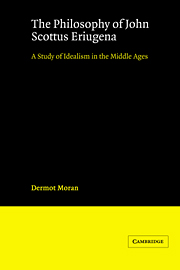Book contents
- Frontmatter
- Contents
- Preface
- Acknowledgments
- Chronology
- List of abbreviations
- 1 European intellectual culture in the ninth century
- 2 The predestination debate
- 3 Eriugena's life and early writings
- 4 The Greek awakening
- 5 The Periphyseon
- 6 Eriugena as philosopher
- 7 Eriugena's sources
- 8 Dialectic, philosophy, and the life of the mind
- 9 The meaning of human nature
- 10 Self-knowledge and self-definition: the nature of human knowing
- 11 The meaning of non-being
- 12 The meaning of nature
- 13 Eriugena's influence on later mediaeval philosophy
- 14 Conclusion
- Bibliography
- Index nominum
- Index rerum
1 - European intellectual culture in the ninth century
Published online by Cambridge University Press: 05 June 2012
- Frontmatter
- Contents
- Preface
- Acknowledgments
- Chronology
- List of abbreviations
- 1 European intellectual culture in the ninth century
- 2 The predestination debate
- 3 Eriugena's life and early writings
- 4 The Greek awakening
- 5 The Periphyseon
- 6 Eriugena as philosopher
- 7 Eriugena's sources
- 8 Dialectic, philosophy, and the life of the mind
- 9 The meaning of human nature
- 10 Self-knowledge and self-definition: the nature of human knowing
- 11 The meaning of non-being
- 12 The meaning of nature
- 13 Eriugena's influence on later mediaeval philosophy
- 14 Conclusion
- Bibliography
- Index nominum
- Index rerum
Summary
Eriugena, an early mediaeval author, wrote during a period of cultural instability when much of the wealth of Greek philosophy had been lost or forgotten. Furthermore, he came from an island off the European mainland, isolated from many of the educational and intellectual developments of the Roman Empire. To have risen from that isolated context to become one of the greatest minds of the ninth century was an extraordinary feat. To have achieved a fairly sophisticated mastery of Greek was itself unusual – in that century Eriugena, Hilduin, and Anastasius Bibliothecarius were among the few who produced translations from the Greek. Eriugena's achievement went deeper in that he was able to enter into the subtleties and complexities of the Greek mind itself, and to produce a remarkable synthesis of two different cultures and two essentially different world-views. What was the intellectual climate of the age into which Eriugena was born?
The rise of mediaeval philosophy in the West took place against the turbulent background of the breakup of the Roman Empire, the expansion of the German peoples in the North and of Islam in the South. Various dates have been suggested for the beginning of the mediaeval period, but for our purposes the most suitable date is a.d. 524, the year of the death of Boethius (born c. 480), the last great scholar of antiquity, who knew both Greek and Latin.
- Type
- Chapter
- Information
- The Philosophy of John Scottus EriugenaA Study of Idealism in the Middle Ages, pp. 1 - 26Publisher: Cambridge University PressPrint publication year: 1989



